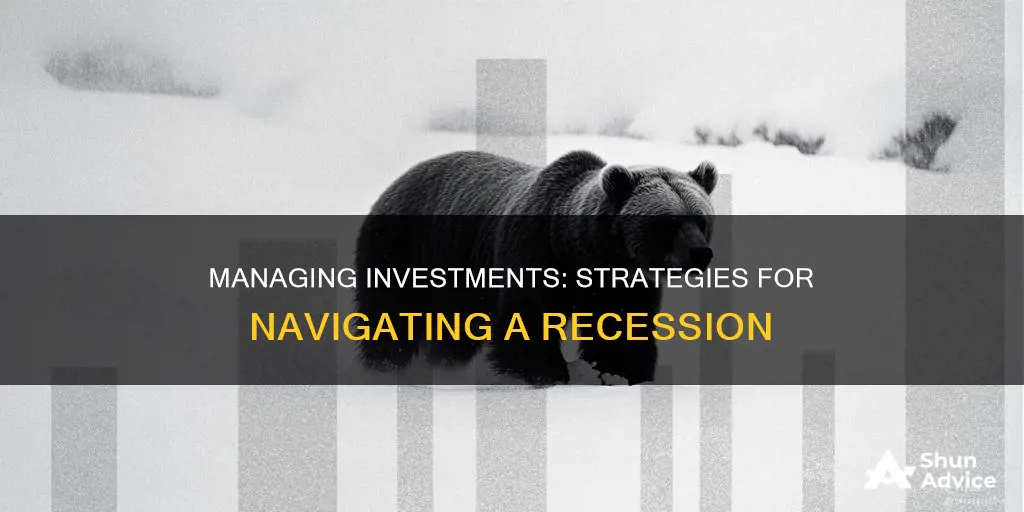
A recession is a challenging time for investors, but it also presents opportunities to make strategic investments. During a recession, investors need to act cautiously and keep a long-term perspective while monitoring the market for opportunities to acquire high-quality assets at discounted prices. Here are some key strategies to manage investments effectively during a recession:
1. Invest in defensive stocks: Focus on sectors like healthcare and consumer staples, which tend to outperform during recessions as they supply essential products that remain in demand regardless of economic conditions.
2. Seek quality over growth: Look for companies with strong balance sheets, low debt, positive cash flow, and stable or recurring revenue streams. Avoid speculative stocks and highly leveraged or cyclical companies, as they pose a higher risk of poor performance during tough economic times.
3. Diversify your portfolio: Invest in a variety of asset classes, such as bonds, dividend-yielding stocks, and funds that track specific sectors. Diversification helps reduce risk and can position your portfolio to benefit from the recovery.
4. Dollar-cost averaging: Consider using this strategy by investing a fixed amount regularly, regardless of stock price fluctuations. This approach helps mitigate risks and allows you to take advantage of lower prices during a recession.
5. Avoid panic selling: Resist the urge to make impulsive decisions driven by short-term market movements. Instead, focus on your long-term financial goals and maintain a well-diversified portfolio.
6. Build an emergency fund: Ensure you have sufficient savings to cover your expenses for at least three to six months. This provides a financial buffer during uncertain times and allows you to invest with a longer-term perspective.
7. Take advantage of tax advantages: Utilize tax-advantaged retirement accounts, such as 401(k)s or Roth IRAs, to maximize your investment returns and minimize tax obligations.
| Characteristics | Values |
|---|---|
| Stocks | Health care, consumer staples, utilities, consumer goods conglomerates, defence, large-cap stocks, defensive stocks |
| Funds | Exchange-traded funds, low-cost index funds, dividend ETFs |
| Other investments | Bonds, dividend stocks, fixed-income investments, royalty, insurance-linked securities, carbon credits |
| Portfolio management | Diversification, measured steps to control risk, dollar-cost averaging, tax advantages |
What You'll Learn

Defensive stocks: consumer staples and utilities
Defensive stocks are stocks that show stable performance and consistent dividends, regardless of the state of the economy. They are also called non-cyclical stocks, as they are less prone to the economic cycle of expansions and recessions.
Defensive stocks are considered safe assets that reduce portfolio variability and protect investors during recessions. They are a good option for less experienced investors, as they allow them to get a feel for the market without requiring them to burn through their capital with more aggressive stocks.
Defensive stocks are further categorised into three main sectors:
Utilities
Water, gas, and electric utilities are needed in all phases of the business cycle. They are usually classified as US Large Value. These companies also benefit from a slower economic environment because interest rates tend to be lower.
Consumer Staples
These are everyday products that are still bought even in recessionary times. They include companies that manufacture food, beverages, household and personal products, and packaging. Consumer staples are generally classified as US Large Value, but there are some funds that are considered US Small Blend.
Health Care
This sector includes hospitals, pharmaceutical companies, manufacturers of medical equipment and supplies, and long-term care facilities. Health care is generally classified as US Large Blend, but there are some funds in US Small Blend.
Examples of defensive stocks include well-established companies such as Procter & Gamble, Johnson & Johnson, Philip Morris International, and Coca-Cola.
Savings: A Smart Investment for Your Future
You may want to see also

Large-cap stocks: low debt, strong balance sheets, positive cash flow
Large-cap stocks are shares of some of the largest companies, generally with valuations of $10 billion or more. They tend to be more stable during volatility and have a lower risk of going out of business.
During a recession, investors should look for large-cap stocks with low debt, strong balance sheets, and positive cash flow. These stocks are considered more defensive and are likely to be less volatile during a recession.
- Use a stock screener: Set the market capitalization to "large-cap" or larger, and look for companies with low debt and strong financials.
- Study the company's financial reports: Analyze the company's debt levels, cash flow, and profitability to assess its financial health.
- Look for companies in defensive sectors: Sectors such as consumer staples, healthcare, and utilities tend to be more resilient during a recession.
- Consider the company's track record: Choose companies with a long history of stable performance and dividend payments.
- Nvidia: A semiconductor company with a strong financial position and continued growth in gaming and artificial intelligence.
- Activision Blizzard: A video game company with a solid balance sheet and a history of dividend increases.
- Intuit: A software company with a predictable business model and a strong balance sheet.
- Costco Wholesale: A dependable dividend payer with a strong balance sheet and a history of dividend increases.
- Microsoft: A cash-cow company with a massive growth potential and a strong balance sheet.
- Bristol-Myers Squibb: A pharmaceutical company with a strong balance sheet and a healthy dividend yield.
- Nike: An apparel company with a strong balance sheet and positive cash flow.
Savings Investment: Choosing Wisely for Your Future
You may want to see also

Dividend-yielding investments: dividend stocks and dividend ETFs
Dividend-yielding investments, such as dividend stocks and dividend ETFs, are a good option for investors looking for routine cash payments during recessions. Dividend stocks are shares of a company that distributes a portion of its profits to shareholders based on the number of shares they own. Dividend ETFs, on the other hand, are funds that invest in dividend-paying companies, providing instant diversification and potential income.
When considering dividend-yielding investments, it is important to look beyond just the dividend yield. Here are some key factors to consider:
- Financial Goals: Determine your financial objectives before investing. For example, someone approaching retirement will likely have a more conservative investment strategy.
- Research Dividend Funds: Pay attention to factors such as dividend history, dividend yield, fund performance, expense ratios, top holdings, and assets under management. This information can be found in the fund's prospectus.
- Outline Your Asset Mix: Evaluate your current investments and how you want to allocate your assets. Diversification is key to managing investment risk.
- Know What You Own: Regularly review your investments to make informed decisions and consider seeking advice from financial planners or brokers.
When choosing between dividend stocks and dividend ETFs, here are some additional factors to consider:
Dividend Stocks:
- Dividend History and Track Record: Look for companies with a strong track record of paying and consistently increasing dividends. This indicates good corporate governance and a commitment to returning value to shareholders.
- Financial Health: Assess the financial health of the company by evaluating metrics such as debt levels, profitability, cash flow, and balance sheet strength. Avoid highly leveraged companies with high debt levels.
- Sector and Industry: Some sectors, such as healthcare and consumer staples, tend to outperform during recessions. Consider investing in companies within these sectors.
Dividend ETFs:
- Diversification: Dividend ETFs provide instant diversification across multiple dividend-paying companies, reducing the risk associated with investing in individual stocks.
- Expense Ratio: Consider the expense ratio, which is the annual fee charged by the fund. Lower expense ratios mean more of your investment returns stay with you.
- Dividend Yield: Evaluate the dividend yield to understand the expected income. However, be cautious of extremely high yields, as they may indicate elevated risk.
- Fund Performance: Assess the fund's historical performance over time. Avoid funds with consistently declining returns, even if they offer high dividend yields.
- Holdings and Exposure: Review the fund's holdings to ensure adequate diversification across different companies and industries. Avoid funds with excessive exposure to a single industry.
Dividend Stocks:
- Healthcare and Consumer Staples: These sectors tend to outperform during recessions as they provide essential products and services that consumers continue to demand regardless of economic conditions.
- Large-Cap Stocks: Larger companies with strong balance sheets, healthy cash flows, and low debt tend to be more stable and better able to weather economic downturns.
Dividend ETFs:
- Invesco KBW Premium Yield Equity REIT ETF
- Invesco S&P SmallCap High Dividend Low Volatility ETF
- Global X SuperDividend U.S. ETF
- SPDR Portfolio S&P 500 High Dividend ETF
- ALPS Sector Dividend Dogs ETF
- Invesco S&P Ultra Dividend Revenue ETF
- WisdomTree U.S. High Dividend Fund
- Vanguard Dividend Appreciation ETF (VIG)
- Vanguard High Dividend Yield ETF (VYM)
- Schwab US Dividend Equity ETF (SCHD)
- SPDR S&P Dividend ETF (SDY)
- IShares Select Dividend ETF (DVY)
- ProShares S&P 500 Dividend Aristocrats ETF (NOBL)
Remember, investing during a recession carries risks, and past performance does not guarantee future results. Conduct thorough research, consider your financial goals and risk tolerance, and seek professional advice when needed.
Maximizing Your Extra Savings: Smart Investment Strategies
You may want to see also

Fixed-income investments: bonds
Fixed-income investments are an attractive option during a recession as they can act as a cushion to an investment portfolio when the equity market experiences losses. They can also reduce the volatility of portfolios that include risk assets such as equities.
Types of Fixed-Income Securities
- Dividend-paying funds: Funds that pay dividends, such as mutual funds and exchange-traded funds (ETFs), which offer investors exposure to a mix of different dividend-paying stocks.
- Treasury bonds: Issued by the US government, these are a safe investment, especially for retirees.
- Muni bonds: Issued by local or state governments, these tend to have low default rates and offer tax-free income.
- Corporate bonds: These offer higher yields than government-backed issues but carry more risk.
Tips for Investing in Bonds During a Recession
- Be cautious of high-dividend yields: It is unknown if companies will be able to afford dividends in the future, so very high yields may be a red flag.
- Consider a mix of stocks and bonds: A diversified portfolio that includes both stocks and bonds can help you weather economic challenges. Trying to time the market by moving in and out of stocks is risky.
- Look for high-quality bonds: In a volatile market, high-quality bonds are less likely to experience price volatility.
- Increase allocation to bonds: Proper asset allocation that increases allocation to bonds and cash can create a more stable portfolio to weather an economic downturn.
- Consider short- to medium-term bonds: Bonds with a short- to medium-term duration provide more protection from interest rate risk than longer-duration bonds.
- Be aware of fees: Dividend-paying funds often have fees attached, so it's important to factor these into your investment decision.
Yotta Savings: A Smart Investment Strategy for Your Money
You may want to see also

Actively managed funds
During a recession, active money managers can allocate less capital to sectors that are vulnerable, such as highly leveraged, cyclical, or speculative companies, which pose a significant risk of performing poorly during tough economic times. Instead, they can focus on investing in high-quality companies with strong balance sheets, low debt, and good cash flow, and a track record of weathering downturns. These companies tend to be in industries that are more recession-resistant, such as utilities, consumer staples, and discount retailers.
Overall, actively managed funds can be a valuable strategy during a recession, allowing investors to actively manage their risk exposure and take advantage of market opportunities.
Retirement Planning: Fisher's 500K Portfolio Breakdown
You may want to see also
Frequently asked questions
Some sectors that generally perform better than others during a recession include healthcare and consumer staples stocks. Funds that track specific sectors, such as exchange-traded funds and low-cost index funds, can also be good investments as they provide exposure to specific baskets of securities and reduce risk. Additionally, fixed-income and dividend-yielding investments, such as dividend stocks and bonds, can provide routine cash payments to cushion against downturns.
It is generally recommended to avoid highly leveraged, cyclical, and speculative companies during a recession as they pose a higher risk of performing poorly. Cyclical stocks are often tied to employment and consumer confidence, which tend to be battered during a recession. Examples include companies in the automotive, furniture, and clothing industries. Speculative stocks are often richly valued based on shareholder optimism, which can be tested during recessions.
It is important to reassess your expenses and increase your savings. Having an emergency fund of at least three to six months' worth of living expenses is recommended. Take advantage of tax advantages offered by certain retirement accounts, such as 401(k)s or Roth IRAs. Additionally, consider diversifying your investments, especially if you are a beginner. Index funds, such as mutual or exchange-traded funds that track a market index, can be a good place to start.







